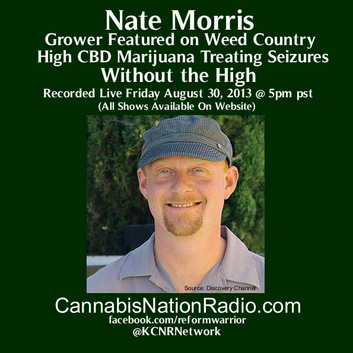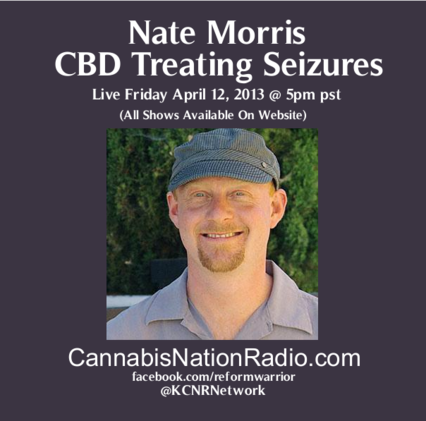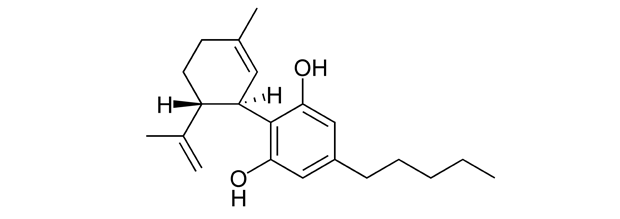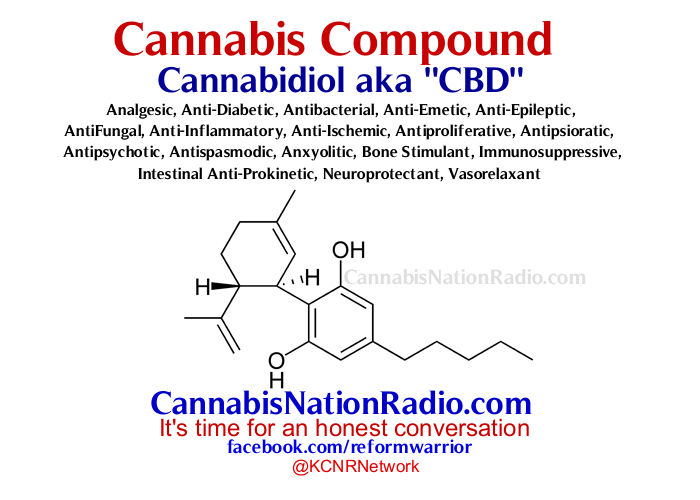Your Donation Helps to Educate Others by Keeping Cannabis Nation News On the Net!
Nate Morris
Nathaniel "Nate" Morris - Cannaxis - August 30, 2013

Nate Morris came back to discuss Cannaxis and talk more about "CBD" a compound in cannabis that has been found to be especially effective in helping seizure patients, including pediatric patients with Dravet's Syndrome. Children with Dravet's syndrome can experience dozens of seizures daily, and some have had trouble finding standard pharmaceutical medicine that effectively stops seizures. CBD however has been found to be effective in treating patients that do not respond to other available medications, and without the side effects associated with standard pharmaceutical drugs. It is important to note that CBD does not produce a "high" effect and in fact counteracts the "high" associated with THC. Selective marijuana breeding has resulted in some strains of marijuana with high CBD and very little THC (which also has medicinal properties). These strains are especially effective for very young patients.
Nathaniel "Nate" Morris - The CBD Project - April 12, 2013

What do you do when your Dr. says they can no longer help you? Or worse yet, what do you do when your Dr. says they can no longer help your child? On the Discovery Channel TV show Weed Country, Nate Morris is approached by a mother whose 3 year old son suffers from treatment-resistant epilepsy. The boy suffers from 10-12 seizures a day--any one of which could kill him. She’s tried a regiment of pharmaceuticals prescribed by her pediatrician--some with side effects such as peripheral blindness, some as heavy as steroid injections, and some that could lead to death.
With no place else to turn, she summons Nate to grow a specific strain of marijuana that doesn’t get the boy high but may, in fact, arrest his seizures and give the family some much needed relief. Nate answers the call but immediately faces serious criminal charges that could put him away for life.
No stranger to risk Nate has been part of “The CBD Project” an effort to help the parents of children with disabilities with high cbd medicine, and continues to push the research envelope in these understudied and treatment resistant diseases and conditions.
Nate Morris offers patients an opportunity to participate in research studies on this amazing plant Nate has dubbed “Valentinex." For more information visit nathaniel-morris.com
To join the facebook group Nate started and mentions on the show visit: CannAxis Patient Network

Cannabidiol "CBD" Cannabinoid
Cannabidiol (CBD) is one of the main cannabinoids present in naturally growing cannabis and in the industrially cultivated varieties of Cannabis sativa L. Non-toxic CBD is not psychoactive, and has several pharmacological properties, among others it acts as a powerful anti-inflammatory and antioxidant compound.
Cannabis sativa L. has been selectively bred for recreational uses to obtain the maximum “high," so the level of delta-9-tetrahydrocannabinol (THC) have been increased very much (up to 20-25%) and, in upping the potency through selective breeding, CBD has been selectively eliminated from recreational varieties or, eventually, it is rarely found in specific varieties. CBD is often found in hemp – in varieties used to produce fiber and seeds. How much is found in hemp seems to be an impossible question to get answered, as Julie Rose has been trying to get an answer to this question for months, from numerous guests, and even those guests from Canada, where it is legal to grow hemp, can't answer the question, as they don't have labs testing for cannabinoid content in Canada.
Cannabidiol —CBD— is a compound in Cannabis that has medical effects but does not make people feel “stoned” and actually counters some of the effects of THC. After decades in which only high-THC Cannabis was available, CBD-rich strains are now being grown by and for medical users. CBD acts as an "anti-psychotic," and was shown in a recent study to be "as effective as a commonly used anti-psychotic pharmaceuticals without the side effects." The study was done on patients hospitalized for schizophrenia.
Scientific and clinical studies indicate that CBD could be effective in easing symptoms of a wide range of difficult-to-control conditions, including: rheumatoid arthritis, diabetes, alcoholism, PTSD, epilepsy, antibiotic-resistant infections, bone disorders, and neurological disorders. CBD has demonstrated neuroprotective effects, and its anti-cancer potential is currently being explored at several academic research centers in the U.S. and other countries.
This week researchers at California Pacific Medical Center in San Francisco announced they have been focusing their attention on cannabidiol.
Sean McAllister, Ph.D., and colleague Pierre Desprez, Ph.D., now believe they are ready for human trials, using the compound to treat metastatic cancer. The pair has produced a synthetic version of cannabidiol, also known as CBD, which they say targets a specific gene in the body related to the spread of cancer. It is interesting to note that they are using a SYNTHETIC version of the compound. Synthetic THC has been available for some time, however many patients complain that it is expensive, and that it doesn't work as well as the natural plant, and many do not like the way it makes them feel in comparison to the natural plant. In the race to synthesize plant compounds to package them nicely and obtain a patent, the entourage effect of the natural plant and the interaction of the various cannabinoids, polyphenols, terpenes and subatomic quirks and quarks are not taken into consideration.
"We found this one compound, CBD, had a specific effect on metastatic cancer cells, very aggressive tumor cells. The bad cancer cells, the ones that spread throughout the body," said Desprez.
In their recently published study the team documented that effect on brain cancer in a large scale animal trial. They say brain scans revealed the disruption of the tumor cells after the cannabidiol was used to switch off a specific gene regulator.
"We find when you treat with CBD, you down regulate the expression of this protein, and that inhibits the disease process," explains McAllister.
The team at California Pacific Medical Center believes the current results, coupled with the non-toxic nature of CBD, is now encouraging enough to warrant human trials, which they hope to secure funding for in the upcoming months. In anticipation, the team has designed two trial models, one for brain cancer and the other for breast cancer.
All while the federal government continues to maintain the farcical position that "there is no medicinal value in marijuana."

Comments for this guestbook have been disabled.




